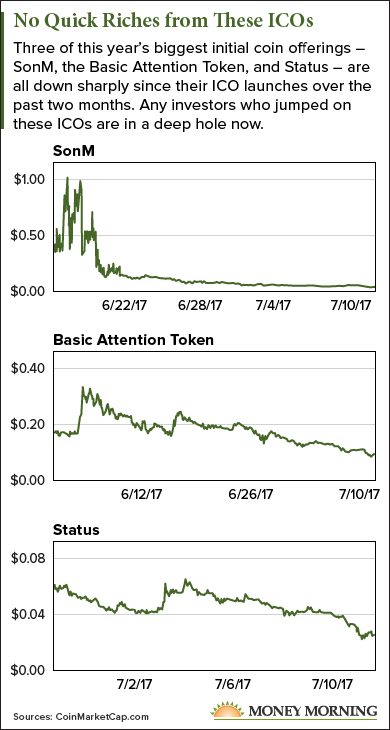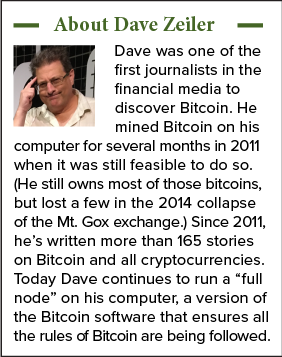The Wall Street Journal should know better.
It's bad enough that some investors view initial coin offerings (ICOs) as a digital get-rich-quick strategy.
But it's irresponsible for the nation's most-trusted investing publication to encourage this idea.
 On July 7, WSJ ran a story on its website with the headline, "Forget an IPO, Coin Offerings Are New Road to Startup Riches."
On July 7, WSJ ran a story on its website with the headline, "Forget an IPO, Coin Offerings Are New Road to Startup Riches."
The story notes that ICOs have already raised $1 billion in 2017. The first quote, from a Silicon Valley lawyer who advises startups on how to structure their coin offerings, is "It's very hot right now."
The label on one of the charts, which shows the amounts raised by the biggest ICOs so far this year, is "Ka-ching." Another chart showing the increase in ICO amounts raised by year is labeled "Virtual Bonanza."
Reporter Paul Vigna waits until a third of the way through the story to point out the risks, but only spends just four paragraphs on them before returning to more examples of ICO successes.
Here's why WSJ's rosy portrayal of ICOs is so troubling...
Initial Coin Offerings Have Been Hammered This Year
While Vigna focuses a great deal on the extraordinary amounts of money that ICOs have raised - several recent ones have brought in more than $100 million - he fails to point out that most of the cryptocurrencies launched with ICOs this year have plummeted in value.
Urgent: An incredibly rare gold anomaly is shaping up in the markets as we speak -- one that has occurred ONLY twice in the past 20 years. And it's about to happen again. Details here...
And we're not talking about 15% to 20% pullbacks. Most of the biggest ICOs from the past few months are down 30% to 60%.
 One cryptocurrency, SonM, raised $42 million in its June 16 ICO. The concept behind it is to use cryptocurrency to create a cloud-based computing platform. But since then, its SNM token has cratered 90% in value, from $0.42 per coin to $0.04.
One cryptocurrency, SonM, raised $42 million in its June 16 ICO. The concept behind it is to use cryptocurrency to create a cloud-based computing platform. But since then, its SNM token has cratered 90% in value, from $0.42 per coin to $0.04.
The Status ICO on June 28 raised an impressive $90 million. Status is a messaging platform that aims to link Ethereum's decentralized applications (Dapps) to other widely used platforms, such as Android and iOS. A compelling concept, but the SNT token has plunged 59% in less than two weeks.
Another highly anticipated ICO, the Basic Attention Token (BAT), raised $35 million in its June 1 ICO. These tokens are intended to integrate with the Brave web browser - a pretty good idea from an established operation. But the BAT cryptocurrency is down nearly 45%.
And the list goes on. The BNT tokens for Bancor, which raised $153 million on June 22, are down 55%. MobileGo raised $53 million on June 11; its MGO tokens have fallen 68%. TenX raised $64 million just days ago (July 8) and already is down 37%.
While ICOs have great potential as a way to crowdfund startups based on digital currencies and the blockchain, this form of investing is very new territory.
It's easy for investors to look at the huge increases in the price of Bitcoin and price of Ethereum and think they need only "get in on the ground floor" of any new cryptocurrency to become rich practically overnight.
But the reality is a lot more complicated...
Why ICOs Aren't Like Bitcoin and Ethereum
[mmpazkzone name="in-story" network="9794" site="307044" id="137008" type="4"]
While ICOs have some features in common with Bitcoin - they're both digital tokens based on blockchain technology - there are key differences.
The main difference is that ICOs are typically controlled by a startup company. The purpose of the ICO is to help raise capital for the startup while simultaneously distributing its digital tokens to potential customers. Ideally, the digital tokens sold are an integral part of the startup's business.
For instance, the Basic Attention Token is a tool to help online publishers monetize content. The tokens are to be exchanged in an ecosystem that includes advertisers, publishers, and users.
 Bitcoin, on the other hand, is a decentralized digital currency. No entity controls it - no government, no central bank, and no company. It was developed in the wake of the 2008 financial crisis as an alternative to fiat currencies and a rigged financial system.
Bitcoin, on the other hand, is a decentralized digital currency. No entity controls it - no government, no central bank, and no company. It was developed in the wake of the 2008 financial crisis as an alternative to fiat currencies and a rigged financial system.
So Bitcoin's value derives from how well it ultimately fulfills that role.
Related: How to Buy Bitcoins - Your Guide to Digital Profits
But ICOs are very much tied to the companies that create them. If the startup fails, so will the cryptocurrency.
Just as in the venture capital world, many things can torpedo a startup backed by an ICO -- a poor business model, incompetent founders, too much competition, or even bad luck.
According to CB Insights, 70% of all startups that land at least one stage of venture capital funding fail before they are either bought or go public with an IPO.
Those are the real odds facing ICO investors. Despite all the millions we're seeing raised now, the majority of these startups will fail - and render their associated cryptocurrencies worthless.
And that's not all potential ICO investors have to worry about...
ICOs Are the Wild West of Startup Investing
Although ICOs can raise a lot of money for a startup, and the tokens created are traded on various cryptocurrency exchanges, they are virtually unregulated.
Because the tokens are considered "products" (since they are used as a part of a business), the U.S. Securities and Exchange Commission (SEC) does not consider them securities.
That makes ICOs possible, but it also means investors have almost no protections. What regulation does exist was set out in the 2012 JOBS Act, which set up rules for crowdfunding new businesses.
Those rules require some disclosures be made to the SEC, but not nearly so much as is required of a company going through the IPO process.
Remember, venture capitalists meet with the entrepreneurs and study the startup in detail before deciding whether to invest. And they still only have a 30% success rate.
All of this isn't meant to knock ICOs. But investors need to have realistic expectations.
Someday ICOs may turn out to be the greatest innovation in investing since digital stock prices, but until there's a lot more oversight, most investors should resist the temptation.
For those who want some exposure to digital currencies, putting a little money into the more established Bitcoin or Ethereum is the better bet.
Follow me on Twitter @DavidGZeiler and Money Morning on Twitter @moneymorning, Facebook, or LinkedIn.
Up Next: A perfect storm is brewing... bringing with it the greatest wealth event in 20 years. And it involves a completely unique "gold" play. The cash windfall from this rare event is expected to reach a whopping $13 billion. Find out more.
About the Author
David Zeiler, Associate Editor for Money Morning at Money Map Press, has been a journalist for more than 35 years, including 18 spent at The Baltimore Sun. He has worked as a writer, editor, and page designer at different times in his career. He's interviewed a number of well-known personalities - ranging from punk rock icon Joey Ramone to Apple Inc. co-founder Steve Wozniak.
Over the course of his journalistic career, Dave has covered many diverse subjects. Since arriving at Money Morning in 2011, he has focused primarily on technology. He's an expert on both Apple and cryptocurrencies. He started writing about Apple for The Sun in the mid-1990s, and had an Apple blog on The Sun's web site from 2007-2009. Dave's been writing about Bitcoin since 2011 - long before most people had even heard of it. He even mined it for a short time.
Dave has a BA in English and Mass Communications from Loyola University Maryland.



